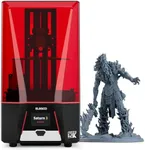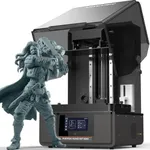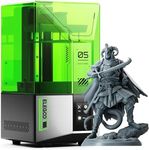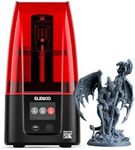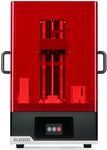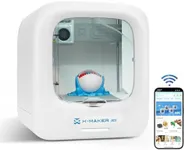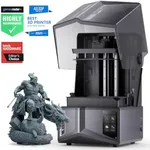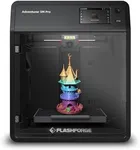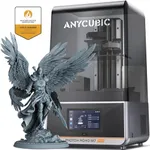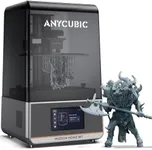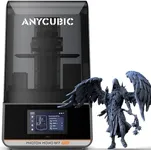Buying Guide for the Best Resin 3 D Printers For Miniatures
Choosing the right resin 3D printer for miniatures can be a bit overwhelming, but with the right knowledge, you can find the perfect fit for your needs. Resin 3D printers are known for their high precision and ability to produce detailed miniatures, making them a popular choice among hobbyists and professionals alike. When selecting a resin 3D printer, it's important to consider several key specifications that will impact the quality and efficiency of your prints. Understanding these specs will help you make an informed decision and ensure that you get the best printer for your miniature projects.ResolutionResolution in resin 3D printing refers to the level of detail that the printer can achieve, typically measured in microns. This spec is crucial for miniatures because higher resolution means finer details and smoother surfaces. Resolutions can range from around 25 microns to 100 microns. For highly detailed miniatures, aim for a printer with a resolution of 25-50 microns. If your miniatures don't require extremely fine details, a resolution of 50-100 microns may suffice. Consider the level of detail you need in your miniatures to determine the appropriate resolution.
Build VolumeBuild volume is the maximum size of the object that the printer can produce, measured in dimensions (length, width, height). This spec is important because it determines the size of the miniatures you can print. Smaller build volumes, such as 120x68x155 mm, are suitable for standard miniatures, while larger build volumes, like 192x120x200 mm, allow for bigger or multiple miniatures at once. Think about the size of the miniatures you plan to create and whether you need the flexibility to print larger pieces or multiple items simultaneously.
Print SpeedPrint speed indicates how quickly the printer can produce a model, usually measured in millimeters per hour. This spec is important for efficiency, especially if you plan to print multiple miniatures. Print speeds can vary widely, with some printers offering speeds of 20 mm/h and others reaching up to 80 mm/h or more. Faster print speeds can save time, but they may sometimes compromise detail. If you need to produce miniatures quickly, look for a printer with a higher print speed. However, if detail is more important, you might prioritize resolution over speed.
LCD Screen QualityThe LCD screen in a resin 3D printer is used to cure the resin layer by layer. The quality of this screen affects the precision and clarity of the prints. Higher quality screens, such as 4K or 8K, provide better detail and smoother surfaces. For miniatures, a high-quality LCD screen is essential to capture intricate details. If you are looking for the best possible detail, opt for a printer with a 4K or higher resolution screen. For less detailed work, a lower resolution screen may be sufficient.
Resin CompatibilityResin compatibility refers to the types of resin that the printer can use. Different resins have varying properties, such as flexibility, strength, and color. This spec is important because it affects the final appearance and durability of your miniatures. Some printers are compatible with a wide range of resins, while others may be limited to specific types. Consider the type of miniatures you want to create and the properties you need in the resin. Ensure that the printer you choose is compatible with the resins that meet your requirements.
Ease of UseEase of use encompasses the user-friendliness of the printer, including setup, software, and maintenance. This spec is important because it affects your overall experience and productivity. Some printers come with intuitive interfaces, easy-to-use software, and straightforward maintenance procedures, making them ideal for beginners. Others may require more technical knowledge and effort to operate. If you are new to resin 3D printing, look for a printer that is known for its ease of use. If you are more experienced, you might prioritize other specs over ease of use.
Customer Support and CommunityCustomer support and community refer to the availability of help and resources from the manufacturer and other users. This spec is important because it can greatly affect your ability to troubleshoot issues and improve your printing skills. Good customer support can provide timely assistance with technical problems, while an active community can offer tips, advice, and shared experiences. When choosing a printer, consider the reputation of the manufacturer for customer support and the presence of an active user community. This can be especially helpful if you are new to resin 3D printing or encounter challenges along the way.
